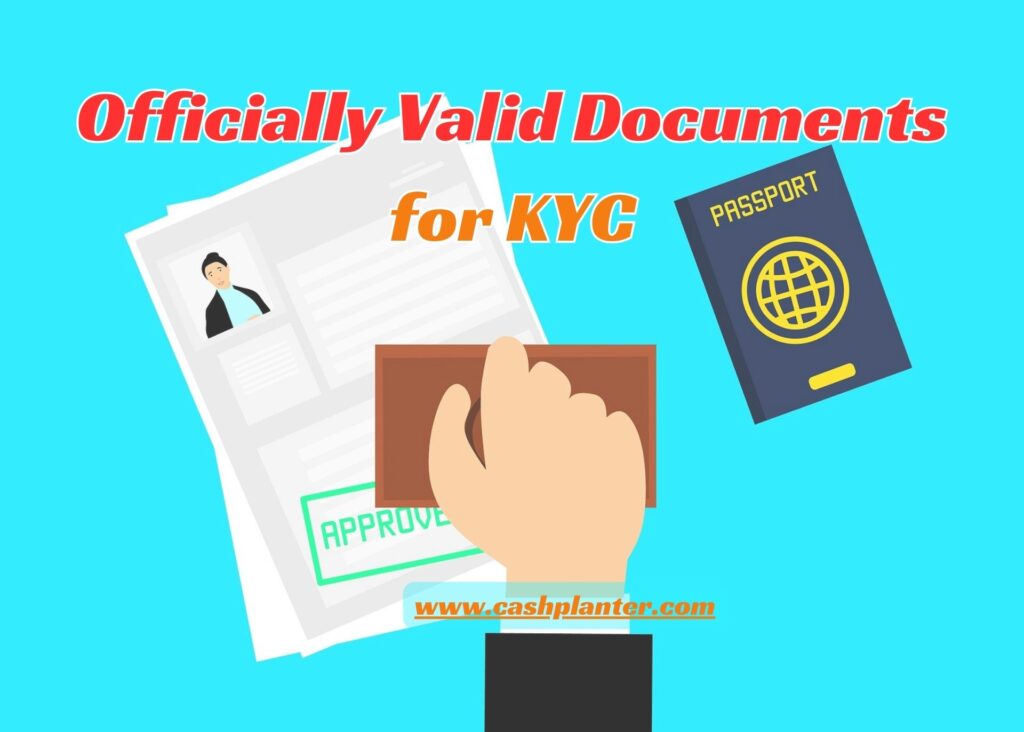In this digital age, Know Your Customer (KYC) rules play a crucial role within various sectors, notably in banking, finance, government scheme, telecommunications etc. KYC processes are critical for confirming the identity of customers to prevent scams, money laundering, and other illicit undertakings. Therefore, possessing officially recognized documents for KYC intentions is essential. Let’s explore the significance of these documents and investigate the six officially valid documents for KYC.

What Are the Officially Valid Documents for KYC?
Officially valid documents refer to identification documents that are recognized and permissible by regulatory authorities to verify the identity and location of individuals. These documents are essential in establishing the identity of customers and guaranteeing conformity with regulatory prerequisites.
The Six Officially Valid Documents for KYC
- Passport: A passport is a governmental issued document that confirms the identity and nationality of the holder. It is widely accepted as a primary form of identification for KYC intentions due to its reliability and authenticity.
- Voter’s Identity Card: Also called an Electoral Photo Identity Card (EPIC), a voter’s identity card is issued by the Election Commission of India. It acts as proof of identity and is commonly utilised during elections. Furthermore, it is recognised as an officially recognised document for KYC.
- Driving Licence: A driving licence is issued by the regional transport authority and acts as both proof of identity and location. It comprises essential details such as the holder’s name, photograph, and location, making it a valuable document for KYC verification.
- Aadhaar Letter/Card: Aadhaar is a biometric identification system issued by the Unique Identification Authority of India (UIDAI). The Aadhaar card, which contains a unique 12-digit identification number, is broadly accepted as a valid KYC document for both identity and location verification.
- NREGA Card: The National Rural Employment Guarantee Act (NREGA) card is issued to individuals who engage in the rural employment guarantee program. It stands as valid proof of identity and location, making it eligible for KYC intentions.
- Letter Issued by the National Population Register: A letter issued by the National Population Register (NPR) comprising details of name and location is recognised as an officially recognised document for KYC. The NPR is a register of usual residents of the country and plays a crucial role in identity verification.
Importance of Officially Valid Documents for KYC
- Compliance with Regulations: Following KYC regulations is mandatory for businesses operating in regulated sectors. By acknowledging officially recognised documents for KYC, organisations guarantee conformity with regulatory prerequisites and lessen the danger of penalties or legal outcomes.
- Preventing Scam and Identity Theft: Utilising officially recognized documents for KYC assists organisations in verifying the identity of customers precisely. This verification process significantly diminishes the risk of scam, identity theft, and financial crimes, protecting both the institution and its customers.
- Building Trust and Credibility: By implementing robust KYC procedures and acknowledging officially recognised documents, businesses showcase their commitment to transparency, integrity, and security. This, in turn, enhances trust and credibility among customers, investors, and regulatory authorities.
Also Read : How to Build a Corpus of 1 Crore: A Step-by-Step Guide to Wealth Accumulation
Summary
In conclusion, officially recognized documents are indispensable for KYC procedures, enabling businesses to verify the identity and location of customers effectively. The six officially recognized documents mentioned – passport, voter’s identity card, driving licence, Aadhaar letter/card, NREGA card, and letter issued by the National Population Register – act as reliable means of identity verification. By adhering to KYC regulations and utilizing these documents, organizations can bolster compliance, prevent scams, and foster trust with stakeholders. The goals of KYC include stopping identity theft, financial fraud, and terrorist funding. Regulatory entities like financial institutions and government bodies establish strict KYC standards to prevent these risks.
The officially accepted documents mentioned above are defined in Rule 2 (d) of the Prevention of Money-Laundering (Maintenance of Records) Rules, 2005 (PML Rules).
Frequently Asked Questions (FAQs)
1.Why are officially valid documents required for KYC purposes?
Officially valid documents are necessary to verify an individual’s identity and address, ensuring compliance with KYC regulations and preventing fraud.
2.Is it acceptable to use expired documents for KYC verification?
No, KYC documents must be current and not expired to be considered valid for verification.
3. What if I do not possess any of the officially valid documents listed?
In such instances, alternative documents may be considered, following regulatory guidelines and at the discretion of the verifying authority.
4. Do specific financial transactions require additional documents for KYC verification?
Additional documents may be requested for KYC verification, depending on the transaction type and regulatory requirements.
5. How frequently should I update my KYC documents?
Regularly updating KYC documents is recommended, especially when there are changes in personal information, to comply with regulatory standards.
Source : www.rbi.org.in

